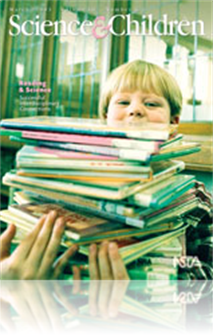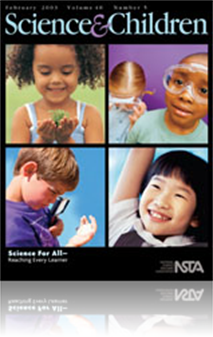All Science and Children resources
Journal Article
The three “legs” on which science instruction rests are the content of science, process of science, and the nature of science. Each leg performs its own function and need not be competitive with the others. This article uses the metaphor of a thr...
Journal Article
Libros de Ciencias en Español (2003)
If we are to encourage Spanish speakers to observe, identify, describe, experiment, and explain phenomena, we should offer them a wide selection of activities that lead them enthusiastically to the study of scientific concepts. From well designed bo...
Journal Article
Outstanding Science Trade Books for Students K-12: (Books Published in 2002)
This article contains a list of the outstanding science trade books published in 2002. It includes information about the selection process, committee, and the NSTA and CBC....
Journal Article
The Ins and Outs of Guided Reading
A teacher and author of children’s books provides a model for incorporating guided reading strategies into the classroom. Includes extensions and cross-curricular activities along with suggestions of what to do before, during, and after reading....
Journal Article
Science 101: How do plants make their own food?
Plants make their own food through a process called photosynthesis, a term that comes from the Greek language, meaning “arranging with light.” In this article, a botanist describes the fundamental concept of photosynthesis. ...
Journal Article
Teaching through Trade Books: Seeing the Seasons
Children’s literature can be a wonderful springboard for classroom learning, motivating students to think scientifically, and helping them develop important science-process skills. The following books: When the Root Children Wake Up and Sky Tree w...
Journal Article
A long-term collaboration between a teacher and a biomedical researcher taught third through fifth-grade students at a science focus school valuable lessons on the value of research. Students created models and presentations on the digestive system, ...
Journal Article
As part of her doctoral research, this author visited a multi-age (K–2) classroom as it studied the five senses. The student-centered, hands-on unit took a community approach—involving visiting professionals, parents, a museum, and school colleag...
Journal Article
Teaching through Trade Books: The Science of Invention
The books What Is a Scientist? and Girls Think of Everything: Stories of Ingenious Inventions by Women are used as springboards for projects in which students in grades K–3 and 4–6 create or modify inventions....
Journal Article
University professors suggest ways to bridge gaps among diverse learners—of different cultural, socioeconomic, physiological, and linguistic backgrounds—through the use of science centers in the classroom. Includes ideas for setting up science ce...



